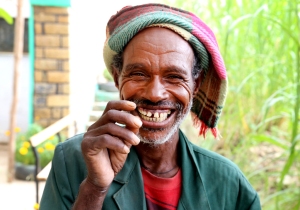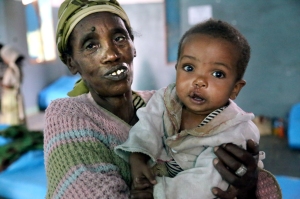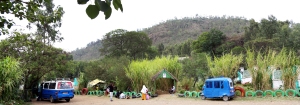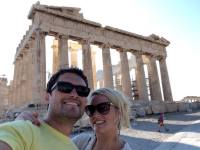In the “Featured Wanderers” section of my site I’m going to be introducing other people who have incorporated work into their travels. I was once inspired by an article that encouraged me to live a life based on seeing the world, without having to give up a somewhat normal life and income. There are tons of positions out there that allow flexibility, and some that not only allow travel, but require it. When I read that article it clicked with me and I based my life around it. I hope that if your passion is to travel and work, someone in this section will have the same effect on you! My first featured wanderer sets the bar high; she has an amazing job that requires her to travel the world while making it a better place in the process. Following her Instagram account will make you want to quit your day job immediately, so be careful!
Meet Molly Milroy, with Operation Smile, an organization dedicated to helping children around the globe with cleft palates and other facial deformities. She is a true global citizen and world traveler whose story is encouraging for those of us who want to imagine a greater future for our planet. She manages and plans trips for hundreds of volunteer doctors and nurses to go treat these patients, no matter where they are. There are tons of opportunities out there to participate in “voluntourism” trips, where you can become a traveling volunteer (which is commendable and I would highly suggest doing!), but this is a true full-time career for Molly. The exciting thing is, there are other opportunities out there like this, so if helping people and traveling sound good to you, then maybe Molly’s story will be of interest to you.
I’m honored to introduce you to Molly here on On Purpose Wanderer. I believe her story defines what this site is about, finding a path to fuse passion and travel, with a career, and a cause that makes our world better than it was before. Please read on to learn more about Molly and the incredible work they do at Operation Smile!
OPW: Tell us a little about yourself. Where are you from, how old are you, where you live right now, your family life, what do you love to do, etc…?
I’m Molly Milroy and I’m 28 years old. I was born and raised in Durham, North Carolina. I currently work for Operation Smile, an organization that provides free surgeries to repair cleft lip, cleft palate and other facial deformities for children around the globe. Operation Smile is based in Virginia Beach, so that is where I am currently living. I moved here in January of 2014 to accept the position of program coordinator. I love photography and videography, making sushi, dancing, good music, the mountains, good red wine, and foggy wintertime walks on the beach with my labra-doodle-mutt Arlo, who loves chasing seagulls.
OPW: How would you describe what you do for a living to someone unfamiliar with Operation Smile?
MM: From the Operation Smile Website: “Operation Smile mobilizes a world of generous hearts to heal children’s smiles and transform lives across the globe. Our network of volunteers works worldwide to repair childhood facial deformities, including cleft lips and cleft palates. As one of the most prominent charities for children in the world, we work in over 60 countries to heal children’s smiles and bring hope for a better future. Operation Smile is the largest volunteer-based medical charity providing free cleft surgeries. Since 1982, Operation Smile – through the help of dedicated medical volunteers – has provided more than 3.5 million comprehensive patient evaluations and over 200 000 free surgeries for children and young adults born with facial deformities. Our work creates a lasting global impact. We train local doctors in developing countries and strengthen healthcare systems so more children in some of the poorest areas in the world can be treated.”
As program coordinators, myself and 16 other colleagues are responsible for the logistics behind running a medical trip. Basically, we plan the medical trips from beginning to end. I’ll explain what I did for Ethiopia to give it some context.
In March, I was assigned the Mekelle, Ethiopia medical mission as the program coordinator. When you are given a mission assignment you are told what the objective for patient numbers is, the site, and the dates. Once we know these three things, we are able to start on volunteer recruitment, confirming plastic surgeons, anesthesiologists, pediatricians, dentists, nurses, child-life specialists, and speech language pathologists, and other non-medical volunteers to the mission. Once the team is full (usually anywhere from 45-70 people) we start sending volunteers specific information about the site we are going to, including cultural specifics they need to be aware of and anything relevant to that country.
Through the planning process we host calls with the Ethiopia team, who live in the capital of Ethiopia, Addis Ababa. On these calls we discuss the mission logistics, patient recruitment, volunteer management, and anything else we need to bring up in order to run a successful mission.
A week and a half prior to volunteers arriving I traveled to Ethiopia to meet with the Ethiopia team. During this time we are on the ground preparing for the mission. One of the most important things that we are doing in this time period is obtaining temporary medical licensure for all volunteers to be able to legally work in country. This is not my favorite part of the job. I have sat in FMHACA (Food, Medicine and Health Care Administration and Control Authority) for hours, and sometimes days, to work on getting volunteers approved to work legally. Ethiopia is a very strict country and there are eleven different original documents (medical license, diplomas, passports, etc) you have to present to them, all notarized in the state of Virginia, in order to be approved. I am glad they have a strict process because it keeps the medical industry safe, but it is very tedious!
During this time we are also working to get the cargo cleared in country. This means that we are working with the government to have them release our cargo so that we can have the 100+ boxes of supplies, equipment, pharmaceuticals and consumables, for our mission. Unfortunately, on this mission in May we had an extremely hard time getting cargo released in time for the mission so we had to work in country to source everything we would need for a mission. Nightmare status. Luckily, it all worked out. Cargo was cleared the day before surgery, loaded into a truck, driven 10 hours north to our site. It arrived at the hospital at 8am on the first day of surgery and our fifty volunteers worked for hours to get everything organized in order to provide safe surgeries.
One of my favorite days of the entire mission is arrival day, when you get the chance to meet all volunteers you’ve been corresponding with for months. It’s always fun to greet people in a new country and be their tour guide, showing them around different parts of Addis Ababa, telling them about the country of Ethiopia, and helping ease their fears about being somewhere new and foreign. I love seeing people become familiar and comfortable with the culture over the course of the ten days that they are in the country. It’s a beautiful process to witness. Having the opportunity to work alongside Ethiopian staff members on our team and at the hospital is so wonderful, and allows for a lot of cultural exchange, interaction and fun!
After arrival day, we traveled by plane to Mekelle, a town in the north of Ethiopia. This was an interesting flight. We had the plane full of Operation Smile volunteers and about an hour into the flight I noticed we started descending, onto what I could tell was just a desert. Before I knew it, we were on the ground, three people got on the plane, and we took off again, bound for Mekelle. To this day I am still not sure where we were or why we touched down in the middle of the desert, but it worked out ok!
As soon as we arrived in Mekelle, we were to visit the hospital where we would be working for the next ten days. Part of your duty as a program coordinator is to confirm that there is enough blood in the blood bank, specific pharmaceuticals, oxygen, running water, etc. After that, we all gather together for our first team meeting at the hotel with the 50+ volunteers, where we discuss the next two days of the mission: screening days.
During screening, patients are given a full exam to see if they qualify for an Operation Smile surgery. Even if they are not cleft patients, the Operation Smile policy is that all people have the right to a full medical exam, so we ensure that. Screening is always extremely hectic. We have most specialties in the hospital in one large room, with a few small rooms off to the side for specialities that need more quiet to do their work, such as the plastic surgeon team, speech language pathologist, and anesthesia team.
After the two days of screening, the schedule is made. The patients are rated on a priority system, based on how significant their need for surgery is. The clinic coordinator, field medical director and others gather together to discuss the schedule for the week and then patient announcement is made.
There are a lot of difficult aspects of this job, but the emotionally challenging part is the day that we do patient announcement. Often, we don’t have enough time or resources to operate on all the patients, so we have to go to the patient shelter and let families know who is and is not a candidate for surgery. The disappointment that I saw on some of the families’ faces will forever be engrained in my mind. But we plan on doing a mission there again, so hopefully there will be another opportunity for them.
Sunday is usually a rest/team day where the team gets an opportunity to bond and explore the city that we are in, and surgery starts Monday morning. Throughout the surgery week, things are insane, but so rewarding. It’s been a privilege to be able to sit in on three different cleft surgeries throughout my time with Operation Smile. I have learned more about the human body and medicine than I thought I’d ever be comfortable with. By Friday in Mekelle we had performed almost 100 surgeries.
OPW: How does Operation Smile select their patients and locations? Do you get assigned to projects, or do you pick them?
Cleft palates occur all over the globe, so Operation Smile goes everywhere. Usually program coordinators are assigned to a specific region, such as Latin America or Africa, but this past year I have gotten to go all over the place. I was in Nicaragua in February, Ethiopia in May, Honduras in August, Ethiopia in October, and Vietnam in November.
In regards to patients, Operation Smile has foundations in the countries that we work on who do patient recruitment. A few months before the mission, they begin the process of letting people know when and where we will be there and what to expect.
OPW: How did you get into this, what kind of steps did you take to put yourself in position to work in such an interesting role where you can help people and make a living?
MM: I think I initially got interested in this type of work at a very young age. When I was three years old, my father moved my family to Lusaka, Zambia, where he worked for an international NGO doing HIV-AIDS education and research. As a child in a developing African country, I was exposed to a new culture and saw the vast ways that people live differently. I think it is this that inspired me to become a global citizen. My dad’s impact and influence in his work in Africa encouraged me to go into similar work. I choose Operation Smile because I like seeing their direct impact. In other NGO organizations it is often difficult to track the difference you are making, but with Operation Smile the change is so immediate and the results are so tangible. You see the direct result of all your hard work pay off in each child’s new smile and new lease on life.
Prior to this I was working as the communications assistant for an independent private school in Asheville, NC. It was a good job and I really did love what I was doing, but there was just something missing. I knew that I was cut out to be doing something like what I am doing now. I love being out in the world and being a part of our global community, and I love using my skills and ideas to help make the world a better place. Since accepting this job in January, I have had so many of those moments this year when you just look at the situation around you and say, “This is my life?” I feel so honored to be working with an organization that is able to change so many people’s lives. It is amazing to be able to create such immediate change. I can’t wait to go back to some of these communities in five, ten, fifteen years and see the lives, families and communities that we impacted.
OPW: What do you like best about your job? What is the most difficult part?
MM: What I like best about my job is what I touched on before: the immediate results that you are able to see, children, families and communities that are directly impacted by your work. In a typical week on the ground, we will do anywhere between 80-150 surgeries. It is a huge logistical challenge to undertake something like this, and on top of that, so many emotions are involved. I think one of my favorite things is when I am at the hospital, seeing a mom go from the waiting area and witness them see their child for the first time, after their cleft lip or palate surgery. There is no holding back tears, especially when you have an overly appreciative family who grab you and say thank you, over and over, for creating this change in their child’s life. I’ll never forget the opportunities I’ve had to hold a mom’s hand and be their reassurance as they wait that 45 minutes that their child is in surgery. It’s been an honor to stand alongside human beings I would never had the chance to meet before and be with them in such a monumental and life-changing moment.
The other incredible part about this job is interacting with the volunteers. I absolutely love the doctors, nurses, and all others who are involved in making a mission happen. It takes a unique person to step out of their daily life and travel halfway across the globe to volunteer their time and energy to change another human beings life. On top of that, they are continually the most understanding, thoughtful and funny people I’ve met, and they have taught me more about myself over the past year. I am very grateful to be able to interact with people from all over the world in such a unique capacity. If any of you are reading this, thank you.
OPW: What is your life like these days? Especially with regards to your lifestyle, job, volunteer activities, travel, etc…? How often are you home versus abroad?
MM: Since August I have been going non-stop. I got assigned to a Honduras mission in early August and then went straight to Ethiopia, and then to Vietnam. It’s been very hectic, but so rewarding!
OPW: What’s your favorite place in the world and why?
MM: My favorite place in the world is Ronda, the loveliest and most historical town of Andalucia, southern Spain. I studied abroad here in 2007 and met one of my now best friends, Megan. We spent our days wandering around the neighboring hills of the city, drinking coffee in the small cafes with tables neighboring the cobblestone streets, eating tapas, and drinking cheap Spanish wine. I encourage anyone who studies abroad to study in a small town. It is so much easier to become a part of the community and feels so much more like home.
OPW: Any advice you’d give to others that may want to follow a similar path? The pros and cons, the risks and rewards?
MM: My advice is just to go for it. It’s terrifying to leave everything behind and move to a place where you don’t know anyone. I had a incredible community of friends and family in Asheville, and had to somehow find the strength to walk away from that to take this job. I encourage people to remember that. I have also made a great community of friends here. All the people who have this job, the 16 other program coordinators, are awesome and understand the difficulties that this work can hold. It takes a specific type of person to be able to do this job and I am honored to be co-workers with these crazy people. We usually get time to travel after missions together, so we’ve gotten really close over the past year and it’s great to be a part of this community. Being with some of your favorite people on the other side of the globe is a unique and awesome feeling.
As you can imagine Operation Smile could always use donations to keep their program running at such an amazing rate. If you feel like giving a little today, click here to make a donation. If you’re interested in volunteering with Operation Smile, check out this link.
Please do yourself a favor and follow Molly’s adventures on her blog and social media accounts below. I’m sure you will find inspiration and have fun sharing in her adventures! If you’re interestd in being a Featured OPW, please send me an email at Chase@OnPurposeWanderer.com.
-Website:mollymilroy.org
-Email: milroy.molly@gmail.com
-Instagram: mollymil
If you’re interested in finding work that allows travel, please check out my Become an OPW page.





